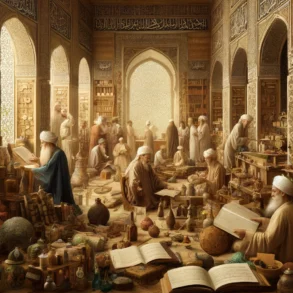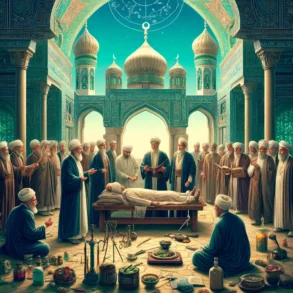Islamic Scholars Early Medicine
Imagine yourself in the period of the Abbasid Caliphate — where scholars from various cultures were brought together in pursuit of knowledge, forming a golden age of intellectual flourishing. Among the many disciplines they tackled was an advanced understanding of medicine and pharmacology, with a significant influence cast by Islamic Scholars. “The Influence Of Islamic Scholars On Early Medicine And Pharmacology” embarks on an enlightening journey, unraveling the profound effects of these scholars’ discoveries and innovations which laid the foundation for modern health sciences. Brace yourself for a captivating exploration of the nexus between faith, reason, and medicine in a time when wisdom knew no borders.

The Islamic Golden Age and the Development of Medicine
Defining the Islamic Golden Age
When you hear the term “Islamic Golden Age,” it refers to a period of significant cultural, scientific, and philosophical advancement in the Islamic world. This period, which lasted from the 8th century to the 14th century, saw incredible breakthroughs in various fields such as art, literature, mathematics, astronomy, and particularly medicine.
Key Developments in Medicine during the Islamic Golden Age
During this golden age, major developments were made in the field of medicine that laid the foundation for much of modern medical understanding and practice. Islamic physicians approached medicine with empirical methods; their focus on observation, experimentation, and documentation set the stage for scientific medical research.
Contributions of Islamic Scholars
Islamic scholars played an instrumental role in advancing the field of medicine. They expanded upon, translated, and preserved the medical knowledge of ancient civilization from Greeks, Egyptians, and Romans. Additionally, Islamic scholars made significant leaps in areas such as pharmacology, anatomy, surgery, therapy, and ethics, shaping medicine as we know it today.
Contributions of Al-Razi (Rhazes) to Medicine and Pharmacology
Brief Biography of Al-Razi
One of these scholars, Al-Razi, famously known as Rhazes in the Western world, was a Persian physician and thinker. He was born during the late 9th century and was well-known for his works in the fields of medicine, alchemy, chemistry, and philosophy. His openness to different thought systems and analytical approach characterized his scientific pursuit.
Al-Razi’s Contributions to Medicine
Al-Razi made immense contributions to medicine, particularly through his writings which introduced a systematic approach to medical practice. His books covered a broad array of topics such as smallpox, measles, child care, and dietetics. Al-Razi also emphasized the importance of physicians continuously learning and refining their skills.
Impact of Al-Razi’s Work on Pharmacology
Al-Razi essentially pioneered the field of pharmacology. He authored a vast compendium of drugs titled “Al-Hawi,” which systematically classified and detailed hundreds of drugs. Al-Razi was also one of the first persons to run clinical trials by testing multiple drugs to determine their efficacy in treating specific ailments.
Ibn Sina (Avicenna) and the Canon of Medicine
Introduction to Ibn Sina’s Life
Another renowned scholar of the Islamic Golden Age was Ibn Sina, also known as Avicenna in the West. Born in the late 10th century, Ibn Sina was a polymath with expertise in various fields from philosophy to astronomy, but it was his work in medicine that had the most profound impact globally.
The Creation and Content of the Canon of Medicine
He is best known for creating “The Canon of Medicine,” a comprehensive medical encyclopedia that became the standard medical text in many universities across the Islamic world and Europe for centuries. The Canon of Medicine discussed medical ethics, drug preparation, diagnosis of diseases, and descriptions of various ailments and how to treat them.
The Influence of the Canon on Global Medicine
The Canon had a profound influence on global medicine by emphasizing the importance of studying and understanding the body, diseases, and their treatments empirically. The book became foundational in the establishment of evidence-based medicine and continued to be a major influence even into the Middle Ages.

Preservation and Digitization of Greek and Roman Medical Texts
Role of Islamic Scholars in Preserving Greek and Roman Medical Knowledge
The contributions of Islamic scholars were not only confined to their original research. They played a significant role in preserving and enhancing Greek and Roman medical knowledge.
Translation Movement during the Islamic Golden Age
This was achieved through the Translation Movement, which was a systematic effort to translate Greek, Persian, and Indian manuscripts on various topics including medicine, into Arabic. As a result, many of these Greek and Roman medical texts only exist today thanks to the preservation efforts of Islamic scholars.
Long-Term Impacts of the Preservation and Translation Efforts
The preservation and translation efforts had long-term impacts beyond the Islamic Golden Age. They ensured the continuation of the wisdom of ancient civilizations and provided new perspectives to improve upon these ideas further.
Medical Innovations and Inventions during the Islamic Golden Age
Medicine and Surgery Innovations by Islamic Scholars
The Islamic Golden Age saw many important innovations in the field of medicine. For example, Islamic physicians were among the first to use animal gut for sutures, create hollow needles, and identify the contagious nature of diseases.
Introduction of Novel Medical Tools and Techniques
Aside from furthering medical knowledge, Islamic scholars also introduced several medical tools and techniques, such as forceps, surgical hooks, and bone saws. They also developed analytical methods for studying diseases, such as urinalysis and pulse examination.
Role of These Innovations in Shaping Modern Medicine
These innovations, both in knowledge and tools, played a pivotal role in enhancing accuracy in diagnosis and treatment, thus shaping modern medicine as we know it today.
Islamic Hospitals and Medical Education
Development and Functioning of Bimaristans (Islamic Hospitals)
Institutionalizing medical practices played a considerable role in the Islamic Golden Age. Islamic hospitals, known as Bimaristans, were not just places for treatment but also centers of learning and innovation.
Training and Education of Islamic Physicians
Medical education was extensive and well-structured in such institutions. Aspirant physicians received rigorous training involving hands-on experience and theoretical lessons. They had to pass an examination and be licensed before being allowed to practice medicine.
Models for Current Medical Education and Hospital Administration
The comprehensive structure used in these medical institutions has been emulated in modern medical education and hospital administration, emphasizing hands-on experience, examination, and licensing.
Islamic Scholars’ Ethical Guidelines in Medicine
Islamic principles and medical ethics
Islamic scholars also made major contributions to medical ethics. Drawing their guidance from Islamic principles, they stressed respect for patient dignity, informed consent, and confidentiality.
Writings and Guidelines by Islamic Scholars
Many Islamic scholars wrote detailed guidelines pertaining to ethical medical practice, ensuring that ethics were deeply intertwined with the practice of medicine during the Islamic Golden Age.
Influence on the Development of Medical Ethics
By doing so, they pioneered various aspects of contemporary medical ethics, including the responsibility of doctors to alleviate suffering and respect the autonomy of patients, which continue to be ethically vital today.
Impact of Islamic Scholars on Herbal Medicine and Pharmacology
Origins of Islamic Herbal Medicine
Islamic scholars built upon the existing knowledge of herbs and plants for medicinal purposes. This marked the origins of Islamic herbal medicine, which incorporated the medicinal properties of herbs in regular medical practice.
Development and Use of Pharmacopeias
They also developed Pharmacopeias, detailed volumes that listed hundreds of drugs along with their effects, preparation and usage. This made it possible for physicians across the region to effectively use these drugs in treating various ailments.
Influence on Modern Medicine and Pharmacology
These contributions significantly influenced modern medicine and pharmacology, with many early drugs and treatments based on the foundations laid during the Islamic Golden Age.
Influence of Islamic Medical Wisdom on Europe
Translation of Arabic medical texts into Latin
As Europe gradually came out of the Dark Ages, they were heavily influenced by the medical wisdom from the Islamic world. Many of the Arabic medical texts were translated into Latin, providing Europeans with an immense wealth of knowledge that had been previously inaccessible.
Impact on the European Renaissance
These translations greatly impacted the European Renaissance by sparking interest and investment in the sciences and specifically medicine. This led to the development of structured medical education and institutions, much like those during the Islamic Golden Age.
Integration of Islamic Medical Knowledge into European Medicine
European scholars heavily studied Arabic medical texts, integrating this knowledge into their medical studies. This foundational knowledge eventually became the backbone of European medicine, which influenced global medical practices.
Contemporary Relevance of Islamic Medicine
Comparison of Islamic Medical Practices to Modern Practices
Comparing Islamic medical practices with modern ones, there is a substantial overlap. Many practices and methods developed during the Islamic Golden Age continue to be in use today, from surgical tools and techniques to ethical guidelines in medicine.
Relevance of Islamic Medical Ethics Today
Islamic medical ethics continues to be relevant today in our understanding of medical ethics. The principles of patient autonomy, informed consent, and confidentiality that were emphasized then continue to be guiding principles in modern medical practice.
Value of Researching Islamic Contributions to Medicine and Pharmacology
Researching Islamic contributions to medicine and pharmacology can give us valuable insights into the roots of modern medicine. Recognizing the immense contributions made during the Islamic Golden Age adds layers to our understanding of the progress of medicine and pharmacology, appreciating the knowledge we have today.
